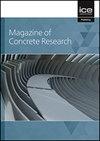不同水平荷载和高温下水泥砂浆的细菌自修复
IF 1.6
4区 工程技术
Q3 CONSTRUCTION & BUILDING TECHNOLOGY
引用次数: 2
摘要
在整个使用寿命中,结构暴露在各种外部影响和载荷下。在这种情况下,在低于设计抗压强度的载荷下导致破坏。虽然有一种基于水泥的修复系统来修复这些损伤,但它往往是不够的。因此,需要一种更有效的自主愈合系统,而微生物诱导方解石沉淀(MICP)是为此目的进行的大部分实验。在这项研究中,细菌砂浆样品生产和加载在不同水平的极限压应力。确定了负载的效果,并研究了细菌处理的有效性。进行了裂纹愈合、抗压强度、吸水率、超声脉冲速度(UPV)和高温效应实验。在细菌砂浆样品中,MICP机制修复的裂缝比对照样品大3.5倍。虽然在90%和100%加载水平下观察到的裂缝和损伤的处理受到自系统的高度限制,但随着加载水平的增加,细菌砂浆的一些性能得到改善。观察到,MICP机制更有效,特别是在高负荷水平的损坏样品中。此外,细菌砂浆在每种载荷水平下都表现出更先进的物理、机械和耐久性。本文章由计算机程序翻译,如有差异,请以英文原文为准。
Bacteria based self-healing of cement mortars loaded at different levels and exposed to high temperature
Structures are exposed to various external effects and loads throughout their service life. Such a case then results in failure at a load lower than the design compressive strength. Although there is a cement-based healing system for repairing these damages, it is often insufficient. Therefore, a more effective autonomous healing system is needed, and microbial-induced calcite precipitation (MICP) was most of the time experimented with for this purpose. In this study, bacterial mortar samples were produced and loaded at different levels of their ultimate compressive stress. The effects of the loads were determined, and the effectiveness of bacterial treatments was also investigated. Crack healing, compressive strength, water absorption, ultrasonic pulse velocity (UPV), and high temperature effect experiments were conducted. In bacterial mortar samples, the MICP mechanism repaired about 3.5 times larger cracks than the control samples. While the treatment of cracks and damage observed at 90% and 100% loading levels were highly limited thanks to the autogenous system, some properties of bacterial mortars improved as the loading level increased. It was observed that the MICP mechanism was more effective, especially in damaged samples with high load levels. In addition, bacterial mortars demonstrated more advanced physical, mechanical, and durability properties at each loading level.
求助全文
通过发布文献求助,成功后即可免费获取论文全文。
去求助
来源期刊

Magazine of Concrete Research
工程技术-材料科学:综合
CiteScore
4.60
自引率
11.10%
发文量
102
审稿时长
5 months
期刊介绍:
For concrete and other cementitious derivatives to be developed further, we need to understand the use of alternative hydraulically active materials used in combination with plain Portland Cement, sustainability and durability issues. Both fundamental and best practice issues need to be addressed.
Magazine of Concrete Research covers every aspect of concrete manufacture and behaviour from performance and evaluation of constituent materials to mix design, testing, durability, structural analysis and composite construction.
 求助内容:
求助内容: 应助结果提醒方式:
应助结果提醒方式:


